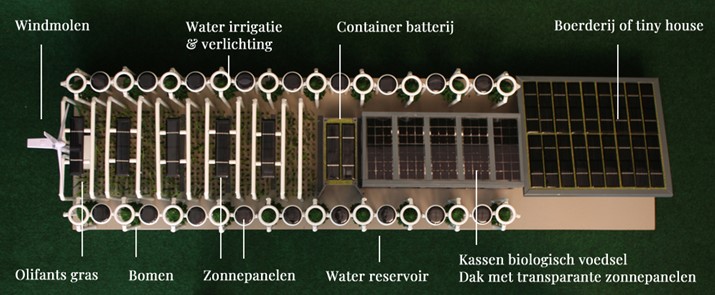Het beoogde project
In Nederland produceren veehouderijen al jarenlang een overmaat aan CO2 & NO2. Cijfers van deze sector van de broeikasgasuitstoot zijn: landbouw (3 megaton CO2-equivalent) wat vraagt om verandering.
Project Emission cleanup biedt een oplossing waarmee boeren of bedrijven in een andere vorm hun werkzaamheden kunnen voortzetten, op basis van duurzame ontwikkelingen. En de strijd kunnen aangaan tegen de overmaat aan geproduceerde CO2 & NO2 door op hele grote schaal CO2 & NO2 te reduceren!
De boerderij of tiny house en het bijbehorende land krijgen een transformatie, waarbij het land wordt verrijkt met bomen en olifantsgras. Het veeteeltbedrijf wordt omgebouwd tot akkerbouwbedrijf (kassen) hiermee kunnen ze duurzaam ecologisch voedsel produceren, en hiermee een gezond financieel bedrijf opbouwen.
3 productielijnen:
- Productie biologisch voedsel (kassen)
- Productie van fruit en gewassen
- Productie olifantsgras t.b.v. bio plastic (om regulier plastic te vervangen)
Naast de boerderij staat een container batterij, bedoeld voor het opvangen van de grootschalige zonnepark energieproductie en windmolen gevestigd op het terrein. Op het dak van de kassen liggen transparante panelen, deze zijn gemaakt van speciale lichtdoorlatende zonnecellen hierdoor groeien planten sneller dan onder gewoon glas. Dat blijkt uit een onderzoek van wetenschappers van de Universiteit van Californië. De container batterij en is ter grootte van een halve of hele zeecontainer.
Led verlichting
Door de verlichting in de dag tijdens de donkere periodes van het jaar (november t/m maart) aan te zetten krijgen de bomen en gewassen meer licht om CO2 en stickstof te reduceren in vergelijking met de sobere dagen van het jaar. Het complex is technisch gezien stand-alone en maakt geen gebruik van het net energie. De energie kan gebruikt worden om het complex te voorzien van elektriciteit en ideaal voor het produceren van groente en fruit in de kassen om biologisch voedsel betaalbaar te maken.
Groene energie
De windmolen heeft een hoogte van 30 meter hoog, geplaatst op het terrein. Met deze windturbine produceert u al gauw 30.000 kWh energie per jaar. Project Emission cleanup kan de opgeslagen energie die in de batterij containers opgeslagen zijn gebruiken om s’ avonds en nachts het complex van energie en verlichting te voorzien.
Irrigatie systeem
Het groen gedeelte zijn eigen irrigatiesysteem dat het overtollige water opslaat in reservoirs onder de grond en kan gebruiken tijdens droogte en kan mogelijk ook ingezet kan worden als brandpreventiesysteem. Het systeem kan op afstand door middel van het GBS (gebouwbeheer systeem) worden aangestuurd. Het irrigatie systeem voorkomt ook dat door droogte de bomen minder CO2 opnemen.
Optimalisatie van het natuurlijke groeiproces:
De bomen en gewassen worden gekweekt met het oog op het optimalisatie van de natuurlijke groei. Dit begint bij de juiste voeding grond en het toevoegen van natuurlijke voedingsmiddelen in het water en extra licht.
Tot slot de naast gelegen grond:
De omringende grondgebieden worden voorzien van natuurlijk bos om uitstervende plant en diersoorten de kans te geven zich te herstellen in een bescherm natuurgebied en met het oog op een natuurlijke biodiversiteit. Door bijvoorbeeld het plaatsen van bijenkorven en het aanplanten van bedreigde plantsoorten.




